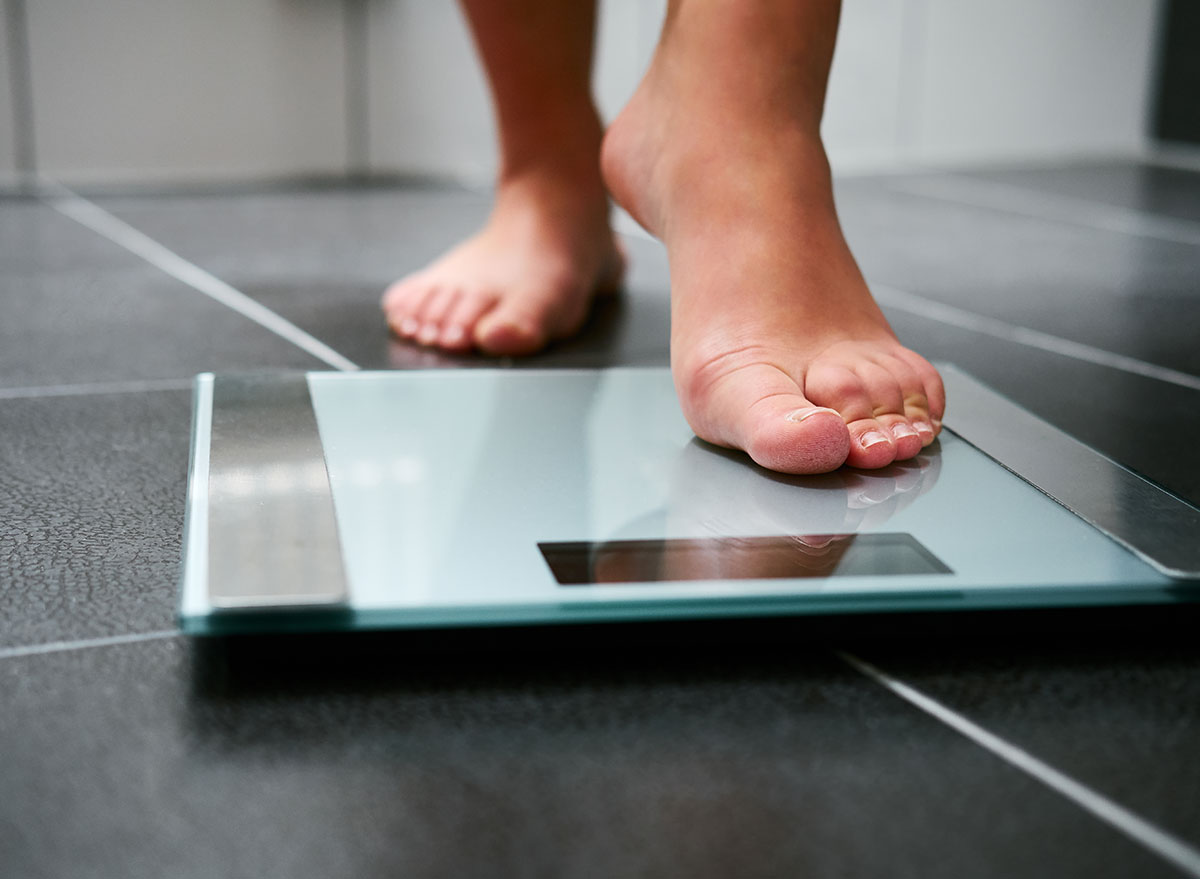7 Major Weight Loss Findings You Should Know

If you're trying to lose weight, you know just how overwhelming the vast amount of information on this topic can be. There always seems to be a new fad diet or workout trend that promises to help you melt away pounds or shed belly fat.
However, when you're pinpointing your weight loss strategy, it's best to talk to your doctor and follow research-backed principles for the best and healthiest results. No need to pore over the latest lengthy studies, because we did the heavy lifting for you. Here are the major weight loss studies of 2020 you need to know about, and what they mean for you and your goals. And don't miss the 21 Best Healthy Cooking Hacks of All Time.
Fruits and vegetables drive weight loss

Produce is packed with impressive benefits: A diet rich in fruits and vegetables can lower your blood pressure, shrink your risk of heart disease and stroke, reduce risk of eye and digestive problems, prevent certain types of cancer, and much more, per the Harvard T.H. Chan School of Public Health.
Now, new research adds to a body of existing evidence that fruits and vegetables can also help you reach your weight loss goals. In a June 2020 review of prospective studies and randomized controlled trials published in the journal Nutrients, researchers found probable evidence that increased total fruit and vegetable intake in women promotes long-term weight stability or weight loss compared to low produce intake.
The study authors note that fruits and vegetables may help with weight loss because their fiber contents help you to feel full faster, they cause you to eat slower, and they're low in calories and fat.
"Low-energy-density foods like fruits and vegetables tend to be more filling due to their high water and fiber content," says Jamie McDermott, MS, RDN, LD. "Eating fiber slows down digestion and makes you feel more full with fewer calories, which aids in weight loss."
One prospective study included in the review found that the top five fruits for weight loss were blueberries, apples and pears, prunes, strawberries, and avocados. The top five non-legume vegetables for weight loss were broccoli, peppers, summer squash, cauliflower, and Brussels sprouts.
"We always hear that fruits and vegetables are good for you, but I really like this study because it shows that they can also be a strategy to help with weight loss," says Dawn Jackson Blatner, RDN, CSSD. "To me, that is kind of surprising because everyone thinks about them for general health, but not always in terms of translating to help with weight."
Only 12% of Americans meet fruit intake recommendations and only 9 percent meet vegetable intake recommendations, per the review. It's worth noting this research was funded by the Hass Avocado Board, but it is significant because it's the first review to specifically look at how increased fruit and vegetable intake affects weight loss primarily in women.
You'll shed more pounds when you team up with your partner

When your partner is on board with your weight loss goals, chances are you'll be more successful. In new research presented at the European Society of Cardiology Congress 2020 in August, researchers tracked 411 participants who adopted healthy lifestyle changes in addition to usual care following a heart attack (though the same principles can apply to someone trying to lose weight) and 413 participants in a control group who only received usual care.
The participants in the intervention group were referred to up to three lifestyle programs for weight reduction, physical activity, and smoking cessation. Their partners could also attend these programs for free, and nurses encouraged them to do so.
Researchers found that patients with a participating partner were more than twice as likely to improve in at least one of the three areas within the year.
"Couples often have comparable lifestyles and changing habits is difficult when only one person is making the effort," said study author Lotte Verweij, a registered nurse and PhD student at Amsterdam University of Applied Sciences in the Netherlands, in a statement. "Practical issues come into play, such as grocery shopping, but also psychological challenges, where a supportive partner may help maintain motivation."
Speaking to your partner about how you can make your weight loss goals a fun experience together may be more effective than talking in terms of "diet" or "cutting back."
"Those words are triggers to someone who's not into it yet," says Blatner. "I usually talk to spouses about having an attitude about how this process can be fun—for instance, by saying 'let's try a new recipe together tonight!'"
There's more evidence that your gut affects weight loss

The beneficial bacteria that inhabit the gut have gotten quite a bit of attention in recent years, and a small June 2020 study in the journal Current Developments in Nutrition shows that these bacteria may affect your weight loss success.
Researchers analyzed baseline clinical and microbiome data to predict six-month weight loss in 36 participants. These individuals were randomized to a coach-directed weight loss program that involved diet and lifestyle modifications.
After six months, 12 participants (or 33%) met the goal of losing more than 5% of their baseline weight. The researchers found that the top predictors of weight loss included gut bacteria that produce acids such as butyrate, secondary bile acids, and succinate. This backs current research that suggests the unique composition of bacteria in your gut may influence weight loss efforts.
"There is some research currently that has linked the gut microbiome and obesity, but it is currently not well understood," says Kasey Hageman, MS, RD, LD. "This study did show some promise in being able to predict weight loss based on the sequencing of participants' gut microbiome."
Eating a healthy diet filled with a broad range of plant-based foods can diversify the bacteria in your gut. "If you have a wide variety of good gut bacteria, you may be more likely to lose weight," says Blatner. "One way to do that is by striving to fit in a variety of 30 different plant foods per week."
One 2018 study published in the journal mSystems found that no matter which diet participants followed (vegetarian, vegan, etc.), those who ate more than 30 different types of plant foods per week had more diverse gut microbiomes than those who ate 10 or fewer types of plant foods per week.
Lack of sleep can bump up your BMI

The effect of catching too few z's has already been shown in several studies, but many of these rely on participant memory to record sleep quality. More recently, a September 2020 study published in JAMA Internal Medicine tracked the sleep quality of 120,000 people for up to two years using smartphone sleep tracking data.
Researchers found that people with BMIs of 30 or higher, which is considered obese by the U.S. Centers for Disease Control and Prevention, slept for slightly less time and had more day-to-day variability in sleep patterns than those with a lower BMI.
One limitation of this study, however, is that people who use sleep tracking devices are often younger, healthier, and come from a higher socioeconomic status than those who do not.
"The results would need to be validated by the appropriate FDA-approved devices, and because the study is likely on younger people who are more economically well off, does that really apply to older folks we worry about with poor sleep?" Raj Dasgupta, MD, associate program director of the Sleep Medicine Fellowship at Keck Medicine of the University of Southern California Dasgupta, told CNN. Dr. Dasgupta was not involved in the study.
Still, this study provides further evidence that sleep patterns are linked to weight management.
"One reason for this involves a disruption in two hormones that help regulate feelings of hunger and fullness," says McDermott. "With fewer hours of sleep, hunger can increase due to a rise in the hormone ghrelin. Meanwhile, the hormone leptin, which is responsible for feelings of fullness, drops."
This, in turn, can lead to greater calorie consumption throughout the day. Sleep deprivation has also been linked to cravings for high-fat, high-carbohydrate foods, adds McDermott.
Keep in mind, however, that there's more to this link than just how long you sleep.
"This research is a good reminder that it's not just about clocking in the right hours of sleep, but avoiding high variability," says Blatner. "You can't undersleep and then oversleep to make up for it the next day. It's about consistent sleep at the right hours, which is an interesting angle from this study."
Using an online program for weight loss may help you stay on track

If you have trouble sticking to certain weight loss habits, an online weight management program may help. In a November 2020 randomized clinical trial published in JAMA: The Journal of the American Medical Association, researchers divided 840 patients who were overweight or obese and had a diagnosis of hypertension or type 2 diabetes into three separate groups.
Participants in a usual care group were mailed general information about weight management. Meanwhile, participants in an online program only group and a combined intervention group were registered for an online program. Those in the combined intervention group also received weight-related health management—including extra support from non-clinical staff who monitored participants' progress in the online program and reached out regularly.
The researchers found that combining health management with an online program resulted in a small but statistically significant greater weight loss after 12 months compared to usual care or an online program only.
"Anytime there is increased accountability or support, the odds of long-term weight loss success will increase," says McDermott. "The subjects in this study had both education and structure from the online program, combined with personal support from program outreach staff members to reinforce positive behaviors and help cope with challenges."
The results of this study also have important implications during the COVID-19 pandemic.
"Virtual care is going to stay with us post-pandemic, and this study provides more evidence that even pre-pandemic, virtual care for some conditions is working," corresponding author Heather Baer, ScD, an associate epidemiologist in the Division of General Internal Medicine and Primary Care at Brigham and Women's Hospital, said in a statement.
You can mimic this type of support by using a free app or an online weight loss program and sharing your goals with loved ones. Eat This, Not That! recommends starting with the free app, Lose It!
"Sharing your weight loss journey with others and seeking out family, friends, or mentors who can offer support is a strategy that has positive implications for most people," adds McDermott.
Losing excess weight could protect you from thyroid cancer

Although several studies have confirmed that obesity is linked to a higher risk of certain cancers, including thyroid cancer, November 2020 research published in the journal Oral Oncology has found that losing weight can actually help reverse that risk.
Researchers identified 31 studies with more than 24 million cohorts from three major databases of published research. A pooled analysis concluded that individuals who are overweight or obese have a higher risk of thyroid cancer—and the risk is even higher for obese women. However, losing weight decreases that risk for both men and women.
"Thyroid cancer has been on the rise since the 1970s, with one estimate finding a 58% increase of thyroid cancer rates between the years of 1973–1977 and 1998–2002," write the researchers. "Shifting our practice to include weight control strategies will help lead to cancer prevention."
Exercise is important but doesn't necessarily guarantee weight loss

You already know that exercise is extremely important for your physical and mental health, but that doesn't necessarily mean it'll cause you to drop pounds—so don't be hard on yourself if your scale isn't budging after daily sweat sessions.
In a June 2020 study published in the journal Current Developments in Nutrition, researchers randomly assigned 383 participants to either a reduced-calorie diet, a diet plus a moderate dose of physical activity, or a diet plus a high dose of physical activity. While weight loss was observed in all of the interventions, physical activity did not appear to enhance weight loss.
"It's important to realize that exercise does not help you lose weight, which this study shows—and at the end of the day, it is a weight maintenance tool," says Blatner.
You should continue to work out regularly—the CDC recommends at least 150 minutes a week of moderate-intensity aerobic activity and at least two days a week of muscle-strengthening activity. However, you shouldn't count on it as your main method of shedding pounds.
Regularly working out will still give you plenty of other benefits, like better brain health, lowered disease risk, stronger bones and muscles, and a better ability to do everyday activities.
"I always tell my clients that any activity is beneficial, even a leisurely walk or a few minutes of movement," says McDermott. "Too often we believe that if we are not exercising intensely, it's not worth it, but that's not true."
For more help to guide you on your weight-loss journey, don't miss these 200 Best Ever Weight Loss Tips!








